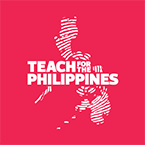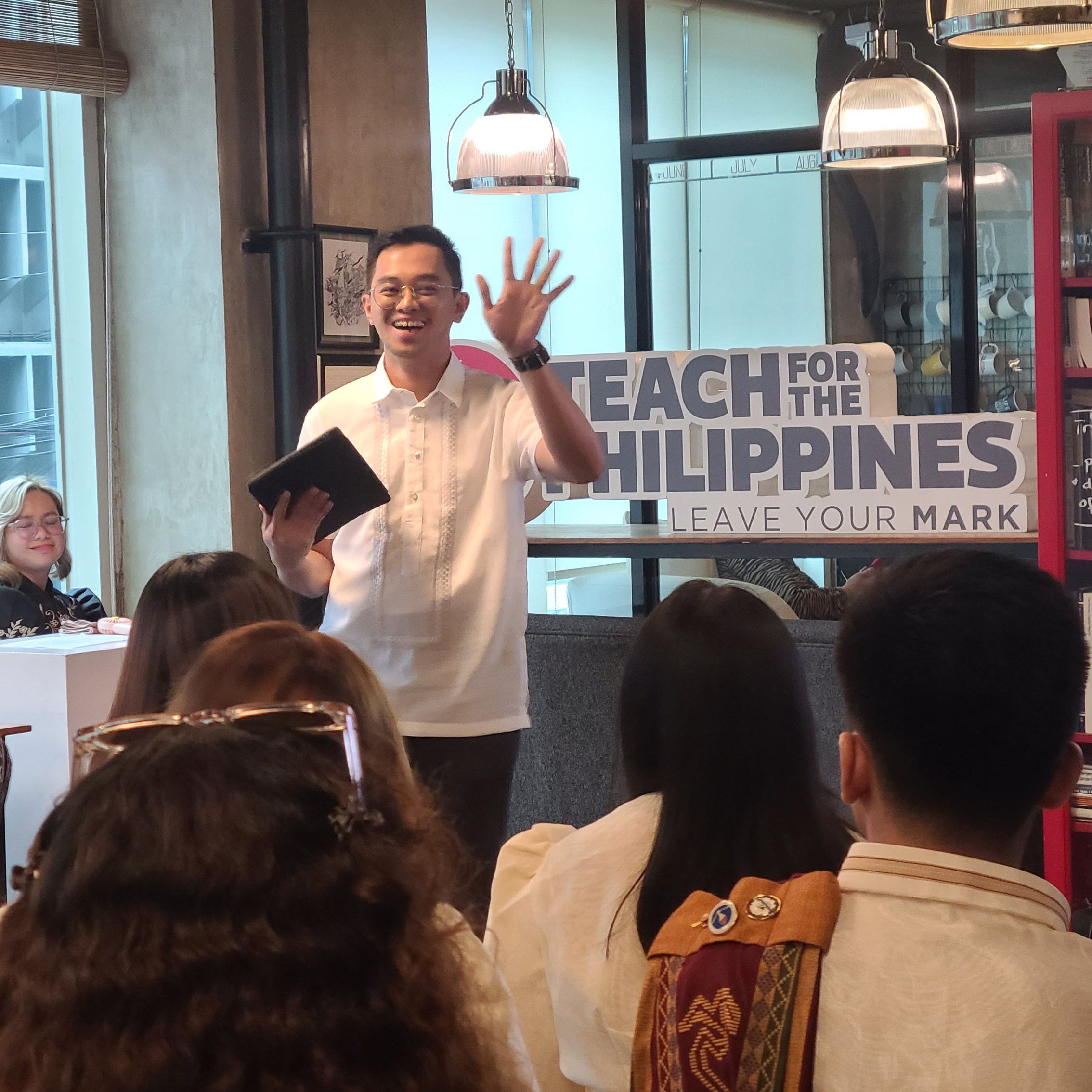Good afternoon, fellow education advocates.
Before anything else, I would like to greet everyone with a very warm and Happy Pride Month!
I would like to start my short message with a question, which I believe has been repeatedly asked already during your interviews and Summer Institute, but taking it a bit further – How confident are you of your why? Gaano ka kasigurado sa iyong bakit?
While you are all pondering on that question, let me share my story – or at least an abridged and sanitized version of it. My plan is to show you how my why guided me but most importantly how I shaped and improved my why.
I started college as an engineering major but found myself shifting to the College of Education after 5 years. It was a painful yet evoking personal journey for me but the transition from a very technical field to a people-centered one helped me identify a clearer path. Being from UP, I always heard we had to “serve the people”. I used to take this very lightly but as I was taking more courses in education especially in my major, Special Education, it became clearer that to serve the people best meant to be part of the public school system.
Fast forward to 2021, in the middle of the pandemic, I started the Fellowship program with the first version of why – to face each day with the intention to be better than I was the day before. And in all honesty, it helped a lot. I remember Ginny’s analogy of the Fellows being rubber bands that will be pulled to different directions and will be stretched to orientations that one never expected were possible. For my case, I made the Fellowship journey my own, from applying twice, getting deployed during the pandemic, wearing multiple hats in the Fellowship, and interacting with the community as intentionally as possible.
Let me share some lessons during the Fellowship that I still bring with me now in our work at EDCOM 2:
1. You cannot pour from an empty cup.
Teaching alone is already difficult enough. Leaving your comfort zones and support systems and relocating to another place brings everything to a whole new level. I remember crying during my first few nights because I was deployed alone and had to move as intentionally as I could on the get-go. But I believe it really nudged me to be more action-oriented and intentional in seeking opportunities to better care for myself.
The Fellowship will require a lot from you. But if there is one resource that I learned to be prudent with – it was of myself. Magpahinga, alagaan ang sarili. Kung sa tingin mo bibigay ka na sa dami ng kailangang gawin, alalahanin, may bukas pa.
REST.
2. The community knows best.
Your sessions in community engagement should have made it clear that as Fellows you are not messiahs and problem-solvers. The community where I was deployed to and the communities where you will be deployed to are pre-existing, thriving, and will move forward even after our stay. We are mere passers-by in their lives. The best we can do is to listen and listen well so that we understand our communities.
In EDCOM 2, we take pride in the triangulation of our data gathering. We do extensive desk research, aim for benchmarking with best practices in similar economies and lastly, conduct site visits to hear the voice of the people who best know their context and in turn best know how to improve it.
LISTEN.
3. Reform is laborious but rewarding.
In EDCOM2, we deal with a lot of systems-level issues from ECCD, Basic Education, Higher Education, Teacher Education and Development, Technical Vocational Education and Training, and Governance and Finance. As an executive assistant, I get to listen in on a lot of these discussions. It’s actually quite a feat that we still get to sleep at night knowing how much work needs to be done.
This experience now validates my experience during the Fellowship – that for any reform the community initiates, with you, no matter how small, it will always be difficult and challenging. But rest assured, it will be worth it. It has to be.
HOPE.
Those three lessons were fleshed out because of experiences that molded them during the Fellowship and challenged the initial version of my why.
Okay, quick check for understanding, what were the three lessons?
Rest.
Listen.
Hope.
As you face this upcoming journey, I wish you remember these three. I know you will all learn a lot more during your own Fellowships but let these three be starting points for you.
REST. The Fellowship is what you make of it. While it is a given that you would want to do your best for the school community where you will be deployed at, put emphasis on doing your best for yourself. Pace accordingly. Work hard but remember that you can work better only if you take better care of yourself.
LISTEN. The community, with all their differing voices and opinions, just want the best for themselves. I was placed with stakeholders who do their best for their community beyond their personal interests, but clarifications were still needed on how we would listen to their contexts and move forward, not in front of them, not even next to them, but behind them.
HOPE. The work that you have to face as Teacher Fellows is daunting but necessary. Sabi nga ni Fr. Roque Ferriols, “huwag mong tanungin kung mahirap, tanungin mo kung mahalaga.” But beyond this, remember also the words of Fr. Ben Nebres that “learning does not happen in the DepEd Central Office.” Your interaction with the lives of the children puts you in a very privileged position to contribute to their futures.
When you get to the field, you will face a lot of issues, which include but are not limited to, let me know also if you have more questions about them so we can discuss later.
- Learning crisis and stunted learners
- Inefficient systems level assessment
- Overworked teachers burdened with 50+ ancillary tasks, despite the DO 2, s. 2024
- Under-funded placements due to SEF limitations
But I wish that you continue to hope.
Yes, action is important but hoping makes sure we have something to hold on to. Hope because you believe our learners deserve better.
Going back to my initial question earlier, How confident are you of your why? Gaano ka kasigurado sa iyong bakit?
Fist to 5, how confident are you with your why?
For the 3-5s, I can only imagine how strong your resolve is to come up with that. Make sure you get to take care of yourselves and your whys.
For the 2-1s, it’s okay. Let it flow naturally. You will get there.
For if there is one thing I learned with my Why, from the Fellowship to where I am now, it is that my Why is only as important as I allow it to be, and also only as permanent and persisting as I allow it to be. Let it grow and mature as you experience the Fellowship.
Your why should allow you to rest, listen, and hope.
Rest when needed. Listen intentionally. Hope for the best for our learners. BECAUSE YOU ARE NOT ALONE ON THIS, YOU HAVE TFP, YOU HAVE US IN THE GOVERNMENT, AND YOU HAVE YOUR COHORT.
As your hashtag highlights, you are all bringing with you different contexts and baggages in this upcoming journey. Bagamat may iba’t ibang dinadala, #LARGA at nawa’y matutong magpahinga at alagaan ang mga sarili, makinig at magpakinig, at mangarap para sa mas magandang kinabukasan.
Para Sa Bata, Para sa Bayan.
Maraming salamat!
Dom Rolloda was part of the 2021 Cohort and completed his two-year Fellowship Program in Himamaylan City, Negros Occidental. He is currently an Executive Assistant at the Second Congressional Committee on Education (EDCOM II).


